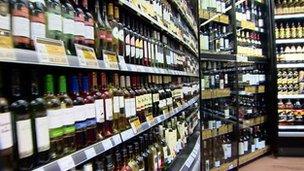Alcohol pricing challenge goes to Court of Session
- Published

Drinks producers argue that the law on minimum pricing breaches EU trade rules
A legal challenge to the introduction of minimum pricing on alcohol in Scotland is under way at the Court of Session in Edinburgh.
The Scotch Whisky Association (SWA) and several European wine and spirits bodies are seeking a judicial review of the legislation.
They argue a law passed by the Scottish parliament last year on minimum pricing breaches EU trade rules.
Both the UK and Scottish governments are respondents in the court case.
The Alcohol (Minimum Pricing) (Scotland) Act 2012 was passed last May, as part of an effort to tackle alcohol misuse.
The Scottish government has said the minimum price would initially be set at 50p per unit, meaning the cheapest bottle of wine would be £4.69 and a four-pack of lager would cost at least £3.52.
The bill received royal assent on 29 June, but Scottish ministers have undertaken not to introduce the measures until after the Court of Session has made its ruling.
The UK government is currently consulting on introducing a minimum pricing policy in England and Wales.
'Poor drinkers'
Setting out SWA's case at the Court of Session, Aidan O'Neill QC argued the policy would hit poor drinkers.
He said health statistics showed that the problem of hazardous and harmful drinking was actually most common among the richer, rather than the poorer, sections of society.
Mr O'Neill said: "What one can draw from that is that hazardous and harmful drinkers are more likely to be found in the rich, rather than among the poor, and the rich, by definition, have more disposable income.
"Therefore a pricing measure which targets cheap alcohol is one ... that can be avoided by the rich.
"If you target hazardous and harmful drinkers then a pricing measure which prices up cheap alcohol and only cheap alcohol is not one which in fact is going to make that target, because it can be avoided because the rich have more money and they can afford the pricing increase.
"What this measure does is it targets poor drinkers."
Commission view
In November, the European Commission voiced opposition to Scotland's plans for minimum pricing, describing them as a disproportionate response to the country's drink problems.
The commission also said it believed the move could restrict imports of foreign alcohol.
Mr O'Neill argued that the commission's opinion was "highly relevant" to the current case.
"It's not binding, but it's certainly an authoritative view of what European law requires," he said.
SWA has been joined in its legal action at the Court of Session by the European Spirits Organisation and European wine body Comite Vins.
They have argued that the law on minimum pricing would restrain trade and breaches the Act of Union, which stipulates there must be a common market across the UK.
However, the Scottish government believes the policy will save lives.
Eight days have initially been set aside for the court action.
- Published6 December 2012
- Published28 November 2012
- Published1 October 2012
- Published28 September 2012
- Published19 July 2012